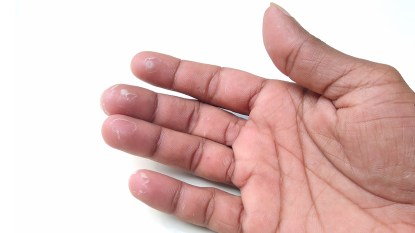June Health News: This Routine Activity May Help Lower Heart Disease Risk by 43%

Want to find out easy ways to manage your weight, protect your heart health, and get a great night’s sleep? Well, it’s worth taking a look at these five recent health news updates for June to show you keep your health in great shape!
Surprising secret to easy slimming.
Chewing more slowly to aid digestion is age-old advice — and now Japanese researchers say doing so may help you lose weight. In their study in Scientific Reports, subjects who chewed and savored their food for 30 seconds before swallowing burned more calories during digestion than those who swallowed normally or savored their food with less chewing. How could this effect lead to weight loss? Study author Naoyuki Hayashi, PhD, points to previous studies showing that chewing triggers activity in the nervous system that enhances metabolism in fat cells.
Routine activity lowers heart disease risk by 43 percent.
You don’t need to do strenuous workouts to reduce your risk of heart disease, say scientists at the University of California, San Diego. In their study of 5,400 women ages 63 to 97, those who got four hours of routine daily activity (like showering, prepping meals, gardening, or vacuuming) lowered their risk of cardiovascular disease by 43 percent and stroke by 32 percent. The researchers say any physical activity reduces heart disease risk by managing weight and lowering the odds of developing diabetes and high blood pressure.
OTC meds better than opioids for arthritis pain.
As many as 40 percent of people with knee osteoarthritis in the US are treated with prescription opioids, which come with a host of dangerous side effects. But in a scientific review of 36 randomized controlled trials, University of Sydney researchers found that over-the-counter non-steroidal anti-inflammatory drugs like ibuprofen are 66 percent more effective than pain-relieving opioids.
Natural strategy ensures deep sleep every night.
You’ve heard the advice to keep bedrooms dark for the best sleep. Now, research from Northwestern Medicine reveals another reason to turn out the lights: Exposure to 100 lux of light (that’s anything brighter than a 15-watt light bulb) activates the sympathetic nervous system to increase heart rate and blood pressure, leading to fatigue and a higher risk of heart disease, diabetes, and metabolic syndrome over time, says senior study author Phyllis Zee, MD. To minimize your light exposure, she suggests installing blackout shades or wearing an eye mask.
A good reason to crack a window.
A new study shows just how important it is to open the window for some fresh air. Texas A&M University researchers found that during the pandemic, levels of VOCs (volatile organic compounds released by carpets, furniture, and paints) and fine particulate matter (fumes from cars, combustibles and dust) were higher in homes than in office buildings. What’s more, most people reported dealing with more symptoms (like headaches and fatigue) while working from home as opposed to being in-office. Thankfully, the fix is an easy one: opening windows for at least a half hour a day to clear out the chemical buildup and welcome spring inside.
A version of this article originally appeared in our print magazine, First for Women.













